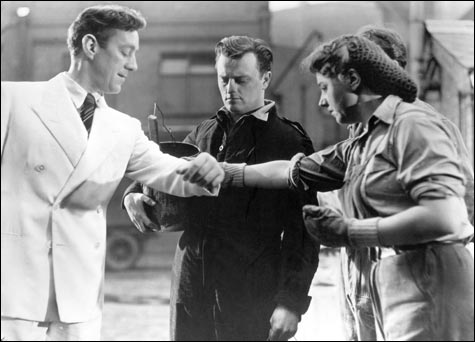
THE MAN IN THE WHITE SUIT: Alec Guinness stars in the most inspired of Mackendrick’s Ealing films. |
| “Alexander Mackendrick and the Anarchy of Innocence” | Harvard Film Archive: January 9-12 |
Alexander Mackendrick, who's the subject of a tribute at the Harvard Film Archive this weekend, is a somewhat mysterious figure in movie history. Over the course of a nearly 20-year career, he made only nine pictures (all of which are being screened), though he stepped in, uncredited, to direct scenes in several others. The son of Scottish parents, he rose in the industry through a series of delightful comedies he turned out for Britain's famed Ealing Studios, but he was actually born in Boston, his most celebrated movie was the Hollywood film noir Sweet Smell of Success, and he wound up as dean of the film department at the California Institute for the Arts. His stint as an academic lasted longer than his film career; he died in 1993, two and a half decades after releasing his last picture, Don't Make Waves.The Ealing comedies of the '40s and '50s were famously script-driven, so it's not a surprise to find that Sandy Mackendrick wrote movies before he began directing them. The screenplays of his four Ealing pictures were written by others; yet it would be unfair to say that as a filmmaker he simply served the material he was handed. He has a distinctive, if muted, visual style. He's splendid at evoking atmosphere, whether of scruffy forgotten wharfs (THE MAGGIE; 1954; January 12) and tiny, intimate coastal towns (WHISKY GALORE!; 1949; January 12) or big cities: a fairy-tale-like, latter-day-Dickensian London in THE LADYKILLERS (1955; January 9), a bustling, night-blooming Manhattan, ripe with the rot of moral corruption, in SWEET SMELL OF SUCCESS (1957; January 10), both marvelously stylized.
He often makes his points through skillful layered staging and canny camera placement. His preference for medium and long shots to allow the action within the frame to tell the story also tends to underscore the wry tone of the comedies — in the lackadaisical movement of the dilapidated boat in The Maggie, the ancient "puffer" whose third-generation Scots captain (Alex Mackenzie) talks his way into ferrying cargo for an American airline millionaire (Paul Douglas), or in the hilariously grotesque deaths of the thieves in The Ladykillers who are bested by a blissfully unaware landlady (Katie Johnson), a survivor of the Edwardian age they unwisely figure in their scheme to move their stolen money. And because Mackendrick picks and chooses his close-ups, they're often eloquent, like the shot of Mackenzie's face when the skipper learns that the American, fed up with the slow, tortuous journey and with his own unexcitable willfulness and wiliness, has decided to buy the boat out from under him.
 Related
Related:
William Friedkin at the Harvard Film Archive, Days of future past, Hanging with The Hurt Locker, More 
- William Friedkin at the Harvard Film Archive
However we may still praise, and therefore bury, the American New Wave, we do still run the genuine risk of slipping down the wormhole slicked by present-moment techno obsessions and amnesiac entertainment-media narcissism.
- Days of future past
Science-fiction films have been with us since Edison’s 1910 version of Frankenstein , but they bloomed in the ’Nam era, nourished by a volatile cocktail of cultural ingredients.
- Hanging with The Hurt Locker
Whatever happens at that other film awards gala in Hollywood next month, The Hurt Locker solidified its hold on indie-minded critics this past weekend when it dominated the Boston Society of Film Critics (BSFC) third annual awards dinner. That film's star, Jeremy Renner, was on hand at the Brattle Theatre on Saturday night to accept his Best Actor award, which the BSFC announced back in December.
- Camera obscura
An acquired taste in French cinema, Philippe Grandrieux is an abstractionist who does narrative features, a post-punk artiste as comfortable making Marilyn Manson music videos as he is war-zone documentaries. But his three major features — which the Harvard Film Archive is screening this weekend and next — revel in a dangerous minimalism.
- All's well that is Welles
Some of the best of the last Orson Welles flicks at the HFA
- Buñuel continues to delight, confound, and shock
Openly, contentedly delighted with how our own dreams can appall us, and how close movies are to that appalling dreaminess, Luis Buñuel — the subject of an extensive survey at the HFA this month — may have been the greatest filmmaker of the medium's first century.
- The films of Sergio Leone at the HFA
He's best known for his westerns, which traditionally are sagas about how civilization begins, how ruthless and cynical men rip it out of the throat of the wilderness. But the end of civilization is what really fascinated Sergio Leone, and the poison within that undoes every would-be paradise.
- Review: Dust
German documentarian Hartmut Bitomsky likes to make movies about how things are put together and how they come apart.
- In the realm of Oshima
The HFA looks back at the bad boy of Japanese cinema
- From kidneys to kittens
The Killdevils have been kicking around the area to much acclaim over the past six years.
- Ground zero
This article originally ran in the January 13, 1987 issue of the Boston Phoenix .
- Miracle at St. Anna
What is the Miracle at St. Anna? Maybe that a filmmaker capable of the eloquence of When the Levees Broke could make such an incoherent movie.
- Less

 Topics
Topics:
Features
, Entertainment, Movies, Alec Guinness, More  , Entertainment, Movies, Alec Guinness, Paul Douglas, Bill Forsyth, Burt Lancaster, Dashiell Hammett, Raymond Chandler, Pauline Kael, Clifford Odets, Less
, Entertainment, Movies, Alec Guinness, Paul Douglas, Bill Forsyth, Burt Lancaster, Dashiell Hammett, Raymond Chandler, Pauline Kael, Clifford Odets, Less 